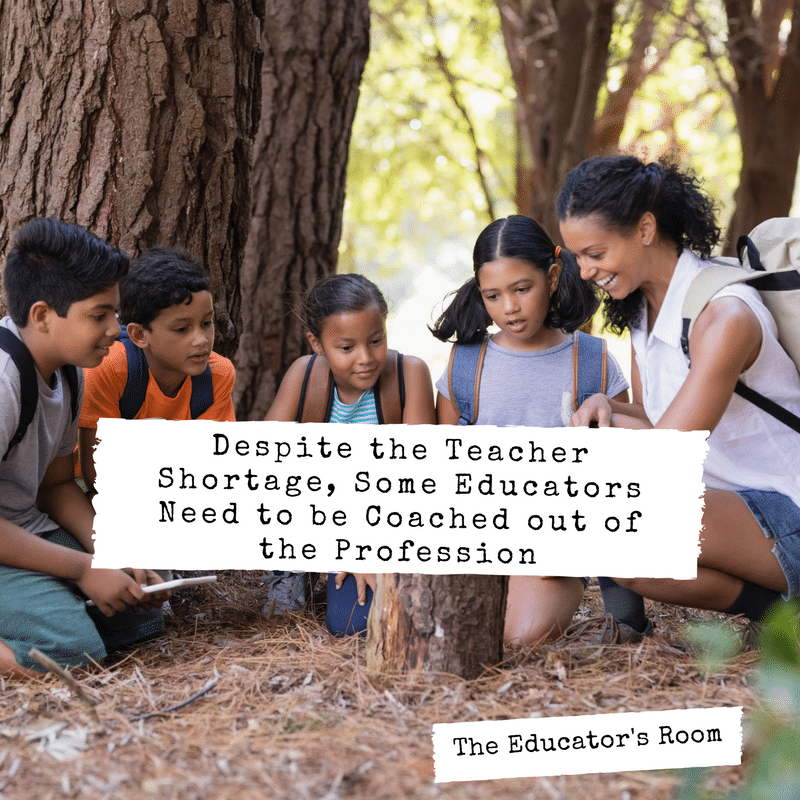When you are a teacher, it is easy to be so consumed with your classroom that you might not notice the work of your colleagues. You might assume your principal did a great job of hiring your colleagues and they are all working their butts off to do what is best for our students just like you are. Unfortunately, this is not always the case.
I have been an academic coach for the last three school years, which means I have had to opportunity to observe for short periods of time or even for the entire class session in numerous classrooms and I wonder how some people made the cut into the profession. I know some of you are thinking, “Hold on; I know.” Yes, fast-track programs such as Teacher for America or The New Teacher Project churns out candidates to fill vacancies mostly in hard to staff schools or charter organizations, but truth be told all of the struggling teachers aren’t from instant teacher programs.
[bctt tweet=”Some of these struggling educators went through traditional four-year programs and still aren’t successful or aren’t fit to serve our students.” username=””]
As a coach, I tell teachers my job is to help you improve whether you stay at this school or move on to another school, but at times I wonder if I should have ever had to coach some people. Should they have already been coached out of the profession? Below, I have included five reasons some educators need to go despite the teacher shortage.
Poor classroom management
Some teachers, even with tons of support from coaches, never learn how to manage a group of students. When there is chaos, learning will not happen. These educators drag down their colleagues because they frequently send their unruly students to other teachers’ classrooms for a break. Or even worse, instead of the administration providing any coaching or support, the principal puts the majority of the unruly students in other teachers’ classrooms. Being a teacher who has been known for having difficult students enrolled in my classes because other teachers couldn’t handle them made me pissed. Not because I didn’t want certain students, but because it was physically and mentally exhausting to always have the difficult class. Truth be told, even though these struggling teachers had the ‘good’ students, they still had problems. Managing students is part of the job and if you can’t master this skill, you need to find another profession.
Can’t execute a lesson plan
Note: I said can’t execute a lesson plan; I didn’t stay can’t write a lesson plan. I know teachers who lesson plans don’t look that great on paper, but their lessons are implemented flawlessly and I know teachers who write wonderful lesson plans and can’t make the plan happen in the classroom. Just a side note, it is pointless for administrators to make teachers submit lesson plans weekly that no one is reading just for the sake of compliance. In reality, you are just receiving a modified version of copied and pasted plans from the previous week or a great lesson plan the teacher doesn’t know how to implement. After observing other teachers, having lessons modeled and receiving support writing lesson plans, the teacher should start making progress, but if he or she doesn’t, the teacher’s students would be better off having a different teacher.
Students aren’t learning
Teachers know the phrase data-driven- they live it on a daily basis. Whether you like that phrase or not, the reality is schools are held accountable for being able to improve academic outcomes. Some teachers just can’t move data whether it is the state standardized tests, district assessments or teacher created assessments. When I taught middle school, we would receive data from the elementary schools for the students we would have the following school year. One of the first actions, my colleagues and I would take was to check the name of the teacher the students had the year before because we all knew if students had certain teachers, they would be behind academically. It is a burden to know you have to work overtime because your student’s previous teacher couldn’t teach effectively.
Blatant misconduct
It surprises me how a small percentage of teachers cross the line, but still manage to stay employed. When teachers are in inappropriate relationships with students, help students cheat on standardized tests, come to work under the influence, but manage to keep their job, it is a slap in the face to other teachers in the profession. It brings down the profession and gives the profession a negative public perception.
Doesn’t believe all students can learn
Last year, my school eliminated my literacy coach position. I had the opportunity to interview with several schools in the district. During one interview, I was asked, “Do you believe all students can learn regardless of background or socioeconomic status?” Of course, I said yes, but a person can seem to be a teacher who will push all students and then reality hits. Administration’s eyes are opened and it is clear by the teacher’s actions and words, this teacher does not believe in all kids. For 11 of my 12 years in this profession, I have worked in majority-minority schools and when I heard my fellow colleagues make disparaging comments about minority students or even mock their abilities, I questioned why they were working in the school. Are you just here for the paycheck because the suburb where you live doesn’t pay teachers as much? If we can’t get these teachers to change their mindset about our students’ abilities, they need to go and fast!
I asked a principal once, why a teacher was kept year after year even though the teacher had poor classroom management, low data, and could not execute a lesson plan. The principal responded, “She shows up each day and she really cares about students. This is better than the potential of having a long-term sub.” When did we start setting the bar so low? When we allow low performing teachers to stay in the profession, it may tempt good teachers to put in less effort. The bigger problem is if those teachers are continually kept year after year, the school will never know if a better candidate would have applied to work at the school.
What would you add? Let’s keep this conversation going.







You’ve made some good points here. I think it’s a fascinating perspective you’ve adopted, especially on sight of the teacher shortage. As a first year literacy coach myself, I often wonder about this idea. I wonder if this criteria you have developed is insurmountable, or if maybe it is the reason we have instructional coaches.
I can teach anyone on the planet to teach; I can’t teach them to care. We have a body of research that says what works in education. We do not have an established population of master teachers. That is our job in the coaching role, to facilitate the growth of teachers, no matter their skill set.
We have students that don’t subscribe to the school experience, and yet we have a responsibility to those students to grow them. I think you’ll find that, in your experience, this was either accomplished by rigid structure, or powerful relationships. I would suggest one or both of these two as a way to grow our people.
It’s not that you’re wrong. Some people need to be coached out of the profession, but not through abandonment. In my mind, the path to success in the classroom needs to be so crystal clear that it’s culturally embedded in your school for teachers who get it to be the majority, and for marginal teachers to feel positive pressure to change to be a part of something, or to find a place where marginal performance is the norm.
So I guess what if really like to ask you is: what do you think is the instructional coaches’ role in this issue?
Hi Ryan. Thanks for your response to my article. I don’t believe abandonment is the answer. I knew someone who accepted a job at a charter school and was terminated one week after working in the school. She was told she wasn’t a good fit. She never received any support at all.
I think an instructional coach should offer support to help the teacher overcome these barriers. I question for how long? Specifically, I wonder why some people who have had support for years still have a job. Yes, I know the issue could have been the coach, but if the coach, administration and even colleagues have provided the support and it is crystal clear, why are we still hanging on to people who can’t do the job?